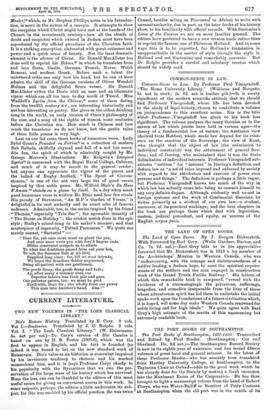COMMON-SENSE IN LAW.
Common-Sense in Law. By Professor Paul Vinogradoff. "The Home University Library." (Williams and Norgate. ls. net in cloth; 2s. 6d. net in leather gilt.)—It is surely significant of the modern scientific attitude that we should find Professor Vinogradoff, whose life has been devoted to the study of legal history, chosen to contribute a volume on jurisprudence to this excellent series. Nor is the title which Professor ;Vinogradoff has given to his book less significant. The volume analyses the many theories as to the nature of law which jurists have held in various ages—the theory of a fundamental law of nature; the A.ustinian view (derived from Hobbes), which made law depend for its exist- ence on the sanction of the Sovereign ; the view of Kant, who thought that the object of law (the submission to individual constraint) was the attainment of general free- dom; and of Tiredly, who maintained that it was the State delimitation of individual interests. Professor Vinogradoff sub- stitutes " volition " for " interest " in Ihering's definition, and defines law as "a set of rules imposed and enforced by society with regard to the attribution and exercise of power over persons and things." The definition is perhaps a little vague, but Professor Vinogradoff knows too much of the way in which law has actually come into being to commit himself to any very definite dogma. Although evidently well versed in foreign systems and the work of Continental theorists, he writes primarily as a student of our own law—a student, moreover, of its practical workings; and the beet chapters in the book are perhaps those which deal with legislation, custom, judicial precedent, and equity, as sources of the English corpus juris.


























































 Previous page
Previous page